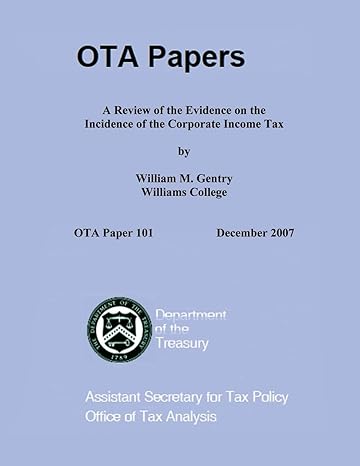Go back


Property Taxes And State Incapacity In Pakistan(1st Edition)
Authors:
Muhammad Mujtaba Piracha

Cover Type:Hardcover
Condition:Used
In Stock
Include with your book
Free shipping: April 03, 2024Popular items with books
Access to 3 Million+ solutions
Free ✝
Ask 10 Questions from expert
200,000+ Expert answers
✝ 7 days-trial
Total Price:
$0
List Price: $6.19
Savings: $6.19(100%)
Book details
ISBN: 0190702559, 978-0190702557
Book publisher: Oxford University Press
Get your hands on the best-selling book Property Taxes And State Incapacity In Pakistan 1st Edition for free. Feed your curiosity and let your imagination soar with the best stories coming out to you without hefty price tags. Browse SolutionInn to discover a treasure trove of fiction and non-fiction books where every page leads the reader to an undiscovered world. Start your literary adventure right away and also enjoy free shipping of these complimentary books to your door.
Property Taxes And State Incapacity In Pakistan 1st Edition Summary: Property taxes are considered progressive and a good way of directly taxing the rich to pay for social services for all at the local level. But they tend to be under-used globally, especially in developing countries. This book offers some explanations on why property tax collection is exceptionally low in the Punjab. In doing so, it delves into the politics of decentralization and yet another failed attempt to establish viable local governments during the era of President Musharraf. Based on original research and the author's long experience in the civil service, the book brings out the motivations of politicians and bureaucrats at the various levels of government, the interplay and frictions within the various tiers of the tax department, as well as the interaction between the tax collectors and the taxpayers. It finds that dysfunction at multiple levels exists for good reasons and perhaps even by design. The book is insightful on issues of tax policy and administration; intergovernmental fiscal relationships; perverse incentives for subnational governments to raid the fiscal commons than raise own tax revenues; weak institutional capacities; non-existent fiscal contract between the state and citizens and the missing loop of political accountability; working of street-level bureaucrats, etc. Any reform initiative, be it of a certain tax, an institution, or of the wider governance structure, cannot move forward meaningfully without understanding the underlying reasons of why things are the way they are, in the first place.
Customers also bought these books
Frequently Bought Together
Top Reviews for Books
Request s0d64r
( 4 )
"Delivery was considerably fast, and the book I received was in a good condition."










